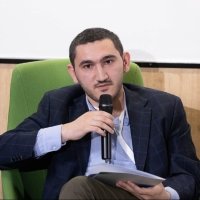
A blog of the Kennan Institute
As the global spotlight shines on Azerbaijan’s capital, host of COP29, the UN climate change conference, critical human rights issues remain in the shadows. Even as international attention is drawn to Baku’s impressive amenities, Azerbaijani authorities are intensifying a crackdown on domestic civil society, silencing journalists, activists, and human rights defenders.
Not all humanitarian issues are being overlooked. In recent Newsweek pieces, Hikmet Hajiyev, an adviser to Azerbaijan's president, advocated for a “COP29 truce” between Armenia and Azerbaijan, while Vartan Oskanian, former foreign minister of Armenia, has called on the international community to urge Azerbaijan to release Armenian political prisoners. Both are worthy causes that speak to regional peace and justice.
The conflict between Armenia and Azerbaijan is rooted in decades of territorial and ethnic tensions, primarily over the Nagorno-Karabakh region. This area, internationally recognized as part of Azerbaijan, once had a large ethnic Armenian population and has been a focal point of violent clashes since the dissolution of the Soviet Union. A year ago, approximately 100,000 Armenians left Nagorno-Karabakh after Azerbaijani forces moved into the region in a decisive military operation.
However, we should not overlook a critical issue: the silent but devastating crackdown on Azerbaijan’s own civil society. While the focus is on Armenia-Azerbaijan relations, Azerbaijani journalists, human rights defenders, and activists face arrests, censorship, and suppression at home.
The 2022 Russia-Azerbaijan Agreement Facilitates Persecution
At the core of this issue is the 2022 Russia-Azerbaijan "Allied Interaction" agreement. Its vague language grants the Azerbaijani government broad authority to target individuals perceived as threats, including democracy and human rights advocates. Article 11 calls for suppressing any activities against state sovereignty, while Article 18 expands this category to encompass so-called information-related crimes—a provision increasingly used to silence critical media voices.
These policies are not just words on paper; they have a very real impact. Sevinj Vagifgizi is a courageous journalist whose family was displaced from Fizuli by Armenian forces in 1993 during the Nagorno-Karabakh conflict. She now fights for press freedom, though her struggles often go unnoticed in reporting highlighting solely ethnic Armenian political prisoners. Akif Gurbanov, a civil society activist and politician, was arrested for supporting Ukraine’s struggle for independence. These individuals, dedicated to strengthening their nation, have been silenced simply for defending the truth.
The independent online television station Kanal 13 faces challenges with its leader, Aziz Orujov, currently incarcerated for his bold reporting on issues the government prefers to keep hidden. Meanwhile, the state-run Russian media outlet Sputnik has joined the fight on the side of the government by labeling organizations such as AbzasMedia “anti-Russian.” Such allegations are part of a broader effort to portray Azerbaijani civil society as a pro-Western puppet set on undermining Russia’s influence.
The situation escalated in 2024 when Sergey Naryshkin, director of the Russian Foreign Intelligence Service, paid a visit to Baku. His visit marked a deepening of ties between Russia and Azerbaijan, with a focus on “joint efforts” to suppress threats. In reality, this means intensifying the crackdown on those who dare speak out against the regime, effectively tightening control over individuals critical of the government.
Aligning with the BRICS
Moreover, Azerbaijan has expressed interest in joining the BRICS, aligning itself with nations such as Russia and China that prioritize sovereignty and noninterference over safeguarding human rights. Initially conceived as an economic grouping, BRICS has evolved into a platform for countries disillusioned with Western dominance, offering them an alternative arena for multilateral engagement.
For Azerbaijan, joining BRICS could deepen ties with other authoritarian regimes, providing greater leeway to suppress civil society while avoiding international scrutiny. This shift indicates a move toward multivector diplomacy whereby Azerbaijan seeks to balance Western and non-Western alliances. Today, the BRICS bloc comprises diverse members that may not share political or ideological leanings but are bound by a desire to assert autonomy in global affairs.
Stateless Persons?
While the Armenian minister rightly calls for the release of Armenian political prisoners, the fate of Azerbaijan’s own citizens, persecuted for their dissenting views, remains largely in the shadows. As a result, the wider oppression experienced by Azerbaijanis goes unacknowledged.
Exemplifying Hannah Arendt’s understanding of statelessness, individuals like Sevinj Vagifgizi—displaced from Fizuli and now fighting for press freedom—are often left out of discussions that prioritize ethnic or political divides. Vagifgizi’s situation, resembling that of Arendt’s stateless persons, underscores how human rights advocates may find themselves isolated when their agendas do not align with dominant geopolitical narratives.
As Western media continue to focus on the conflict between Armenia and Azerbaijan, the struggles of numerous political prisoners and silenced activists in Azerbaijan are often overlooked. The oversimplified narrative that has grown up around the conflict disregards those advocating for a democratic future in Azerbaijan—a future that seems to slip further away each day.
The opinions expressed in this article are those solely of the authors and do not reflect the views of the Kennan Institute.
Author


Kennan Institute
After more than 50 years as a vital part of the Wilson Center legacy, the Kennan Institute has become an independent think tank. You can find the current website for the Kennan Institute at kennaninstitute.org. Please look for future announcements about partnership activities between the Wilson Center and the Kennan Institute at Wilson Center Press Room. The Kennan Institute is the premier US center for advanced research on Eurasia and the oldest and largest regional program at the Woodrow Wilson International Center for Scholars. The Kennan Institute is committed to improving American understanding of Russia, Ukraine, Central Asia, the South Caucasus, and the surrounding region through research and exchange. Read more

Explore More in The Russia File
Browse The Russia File
Chechnya as a Model of Modern Russia

Russia’s Indigenous Communities and the War in Ukraine

Gas and Power in a Changing US–Russia Relationship

